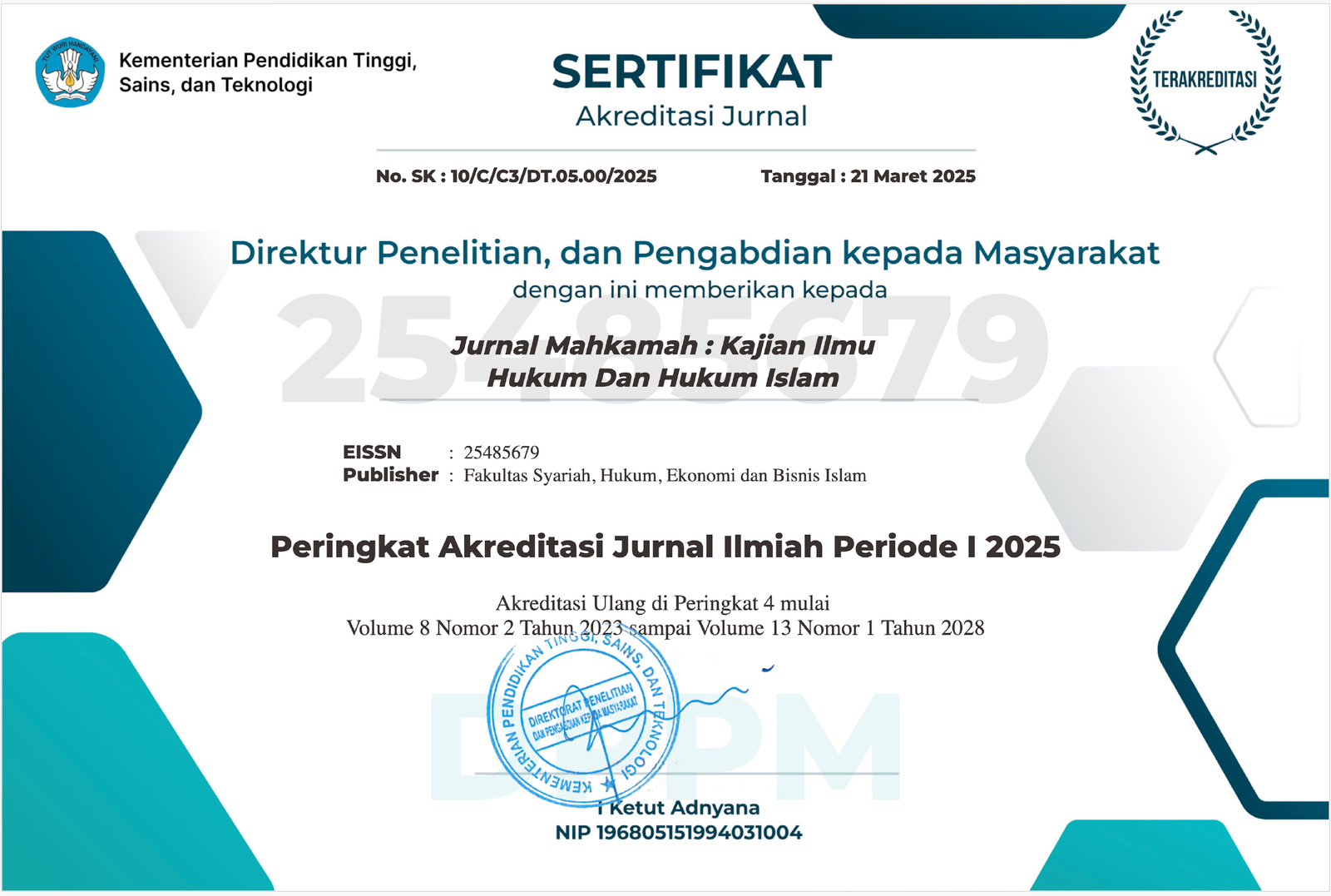Absolute Competency Problems in Settlement of Mortgage Rights Execution Disputes of Islamic Banking in Religious Courts
DOI:
https://doi.org/10.25217/jm.v5i2.1029Keywords:
Execution of mortgage rights, Islamic banking disputesAbstract
Banking activities, especially credit/financing transactions, apart from the existence of trust between creditors and debtors, also require guarantees that have a high liquidity value in the form of material guarantees and individual guarantees. The District Court does not have the authority to resolve sharia economic disputes in any form, including the execution of the object of mortgage rights in Islamic banking which has issued Constitutional Court Decision Number 93/PUU-X/2012. If the ruling or decision issued by the district court is related to implementation the object of mortgage rights in sharia banking, then the stipulation or decision is not valid, this is because there is no regulation between the old law and the new law. This research used a normative juridical approach which was carried out through analysis obtained from library materials linked to statutory regulations and the concept of legal experts as the basis for research. The result of this research was that harmonization emphasized more on equating perceptions of the implied meaning without making editorial changes. Reconstruction of norms, including improving old laws or making new laws by changing the editorial staff of articles that still contain contradictions.
References
A. Mukti, Arto. Praktek Perkara Perdata. Yogyakarta: Pustaka Pelajar, 2000.
Auda, Jasser. Maqasid Al-Shariah as Philosophy of Islamic Law: A Systems Approach. International Institute of Islamic Thought (IIIT), 2008.
Basir, Cik. Penyelesaian Sengketa Perbankan Syariah di Pengadilan Agama dan Mahkamah Syar’iyah. Kencana, 2012.
“Direktori Putusan Mahkamah Agung Republik Indonesia. Putusan Nomor 75/Pdt.G/2014/PN Krg,” 31 Januari 2019. www. putusan.mahkamahagung.go.id.
Harahap, Yahya. Ruang Lingkup Permasalahan Eksekusi Bidang Perdata. Jakarta: Sinar Grafika, 2007.
Mahmud Marzuki, Peter. Penelitian Hukum. Jakarta: Kencana Perdana Media Grup, 2010.
Manan, Abdul. Hukum Ekonomi Syariah; dalam Perspektif Kewenangan Peradilan Agama. Jakarta: Kencana, 2012.
———. Penerapan Hukum Acara Perdata di Lingkungan Peradilan Agama. Jakarta: Prenada Media, 2006.
Mulyono, Wahju. Teori dan Praktik Peradilan Perdata di Indonesia. Yogyakarta: Pustaka Yustisia, 2012.
Nindyo. financial intermediary, 2006.
Nur Yasin, Mohamad. “Pragmatisme Perbankan Syariah dalam Penyelesaian Eksekusi Objek Hak Tanggungan.” Jurnal Al Ihkam 12, no. 1 (2017).
Remi, Sutan. Hak Tanggungan: Asas-Asas, Ketentuan Pokok dan Masalah yang dihadapi oleh Perbankan (Suatu Kajian Mengenai Undang-Undang Hak Tanggungan). Jakarta: Bandung Alumni, 1999.
Sayuthi, Wildan. Sekitar Acara dan Hukum Perdata Agama ( PUSDIKLAT Pegawai Mahkamah Agung RI, 2005.
Soekanto, Soerjono. Pengantar Penelitian Hukum. Jakarta: Universitas Indonesia, 2006.
Syafe’i. Bank syariah berisiko lebih tinggi dibandingkan bank konvesional, 1995.
Downloads
Published
How to Cite
Issue
Section
License
This work is licensed under a Creative Commons Attribution-ShareAlike 4.0 International License.
Authors retain copyright and grant the Jurnal Mahkamah : Kajian Ilmu Hukum Dan Hukum Islam right of first publication with the work simultaneously licensed under a Creative Commons Attribution License (CC BY-SA 4.0) that allows others to share (copy and redistribute the material in any medium or format) and adapt (remix, transform, and build upon the material) the work for any purpose, even commercially with an acknowledgment of the work's authorship and initial publication in Jurnal Mahkamah : Kajian Ilmu Hukum Dan Hukum Islam.
Authors are able to enter into separate, additional contractual arrangements for the non-exclusive distribution of the journal's published version of the work (e.g., post it to an institutional repository or publish it in a book), with an acknowledgment of its initial publication in Jurnal Mahkamah : Kajian Ilmu Hukum Dan Hukum Islam.
Authors are permitted and encouraged to post their work online (e.g., in institutional repositories or on their website) prior to and during the submission process, as it can lead to productive exchanges, as well as earlier and greater citation of published work (See The Effect of Open Access).









